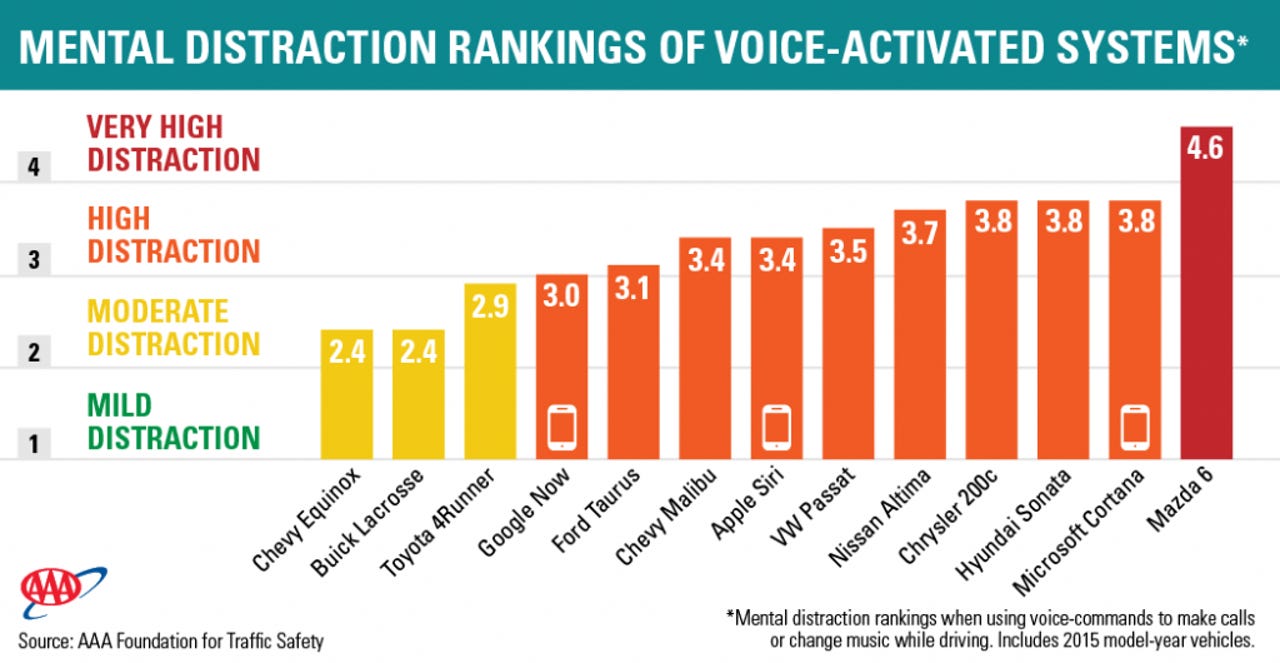Apple Siri, Google Now, Microsoft Cortana, or talking on a smartphone: Which distracts drivers most?


It's perfectly legal to use Apple's Siri, Google Now, or Microsoft's Cortana to issue voice commands to in-vehicle infotainment systems while driving.
But a study from the AAA Foundation for Traffic Safety in the US has found that using voice commands while at the wheel is more distracting than talking on a smartphone while driving.
According to the study, which was conducted by the University of Utah, drivers remain distracted for as long as 27 seconds after using voice commands to dial, change music, or send a text.
That level of distraction could lead to motorists missing stop signs, pedestrians, and other vehicles while mentally shifting from communication to driving, said Peter Kissinger, president and CEO of the AAA Foundation for Traffic Safety.
"The lasting effects of mental distraction pose a hidden and pervasive danger that would likely come as a surprise to most drivers," he said.
The group also found significant differences between how much distraction was caused by Siri, Google Now, and Cortana.
According to the study, Google Now caused the least distraction, followed by Apple's Siri and Microsoft's Cortana, which was so distracting that it was only a shade better than updating social media while driving.
All were found to cause "high distraction" with a rank of 3 or higher on a scale of 5, which corresponds to "a highly-challenging, scientific test designed to overload a driver's attention".Category 1 represents a distraction similar to listening to the radio or an audio book, while a category 2 distraction is equivalent to talking on a phone. Category 3 is equivalent to sending voice-activated texts on a perfect, error-free system. Category 4 is like updating social media while driving.
According to the report, voice assistants are not "error free", which can make them more distracting than talking on a mobile phone while driving.
"Siri was error-prone, producing different responses to seemingly identical commands. In other circumstances, Siri required exact phrasing to accomplish specific tasks and subtle deviations from that phrasing would result in a failure," it notes.
"Moreover, when there was a failure to properly dictate a message, it required starting over since there was no way to modify/edit a message or command. For these reasons and others, voice-based interactions using an intelligent personal assistant, such as Siri, were significantly more mentally demanding than conversing on a cell phone."
AAA CEO and president Marshall Doney hasn't called for new laws to ban the use of voice-activated systems, but has urged users to be cautious while using them and for developers to design systems that are no more demanding than listening to the radio or an audiobook.
A total of 257 drivers aged between 21 and 70 years participated in the study of 2015 model-year vehicles, while 65 additional drivers aged between 21 and 68 tested the three phone systems.
The research chimes with previous studies in Sweden that support the government's hesitance in legislating bans on using a phone while driving. The country has moved to ban texting while driving, but Swedes are permitted to talk on their phones while driving in both handsfree mode and handheld.
One of the reasons it has resisted making it illegal is because of the problem of enforcement. To be effective, it would require a total ban on mobile phone usage, hands-free or otherwise.
A study in Swedish the by Swedish National Road and Transport Research Institute (VTI) released in 2012 referred to evidence that laws permitting hands-free usage hadn't proven any safer than hand-held use.
The US National Transportation Safety Board has long advocated a total ban on phone usage while driving and to bring restrictions on motorists in line with prohibitions on phone usage by pilots during a commercial flight and on-duty rail personnel.
Read more
- Using your phone while driving? Put it away and just drive
- Hack attack: How Siri or Google Now can hear silent commands from 16 feet away
- Cortana can now replace Google Now as a default assistant on Android